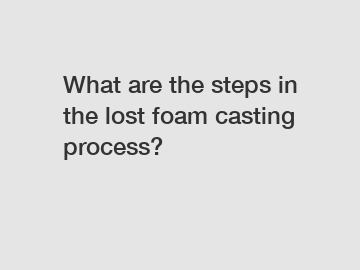What are the steps in the lost foam casting process?
Are you curious about how lost foam casting works? Do you want to know the steps involved in this fascinating process? Well, you've come to the right place! In this article, we'll walk you through the steps in the lost foam casting process in a simple and easy-to-understand way. So, sit back, relax, and let's dive in!
What is lost foam casting?
Before we get into the steps of the lost foam casting process, let's briefly explain what it is. Lost foam casting is a method of metal casting in which a foam pattern is coated with refractory material to form a mold. When molten metal is poured into the mold, the foam pattern vaporizes and is lost, hence the name "lost foam casting." This process is used to create complex and intricate metal parts with high precision.

Step 1: Pattern creation.
The first step in the lost foam casting process is creating the foam pattern. The pattern is usually made from polystyrene foam, which is easily carved and shaped. The pattern is an exact replica of the final metal part that is to be cast.
Step 2: Assembly.
Once the foam pattern is created, it is assembled with a gating system. The gating system includes sprues, runners, and gates that allow the molten metal to flow into the mold and fill it completely.
Step 3: Coating.
Next, the foam pattern is coated with a refractory material, such as ceramic slurry. The refractory material forms a hard shell around the foam pattern, creating the mold cavity.
Step 4: Drying.
After the coating is applied, the mold is dried to remove any moisture. This step is crucial to prevent steam explosions when the molten metal is poured into the mold.
Step 5: Casting.
Once the mold is dried and ready, it is placed in a flask and filled with molten metal. The metal fills the mold cavity, taking the shape of the foam pattern. As the metal cools and solidifies, the foam pattern vaporizes and is lost, leaving behind the metal part.
Step 6: Shakeout and finishing.
After the metal has solidified, the mold is broken apart to reveal the metal part inside. Any excess material, like gating system components, is removed, and the part is cleaned and finished as needed.
And there you have it! These are the steps involved in the lost foam casting process. It's a unique and efficient method that allows for the production of complex metal parts with high accuracy.
If you're interested in utilizing lost foam casting for your metal casting needs, don't hesitate to contact us. Our experienced team of suppliers can help you with all your casting requirements and provide you with high-quality parts. Contact us today to learn more about our lost foam casting services and how we can assist you in creating the metal parts you need.
If you want to learn more, please visit our website Integrated lost foam casting system, EPS Forming Machine, Lost foam casting machine.


